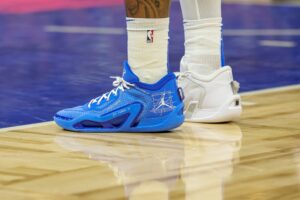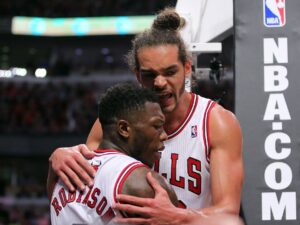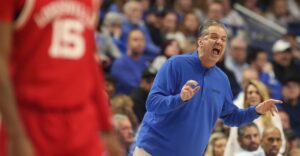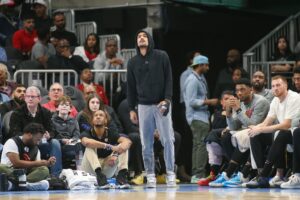With the 10th pick in the 2001 NBA Draft, the Boston Celtics selected Joe Johnson out of Arkansas.
The man now known as “Iso Joe” joined a team that also featured young stars Paul Pierce and Antoine Walker.
For the first time in a long time, the Celtics finally had reason to be hopeful for the future again.
Johnson was selected to the 2002 All-Rookie Second Team and started to show flashes of potential.
As for the rest of his career, Johnson would go on to become a seven-time NBA All-Star and earned a spot on the the All-NBA Third Team in 2010. Johnson eventually became the league’s highest-paid player as well. Yes, even over guys like LeBron James, Kobe Bryant, and Tim Duncan.
The Celtics once again hit on another top-10 draft pick, much like they had recently with Pierce and Walker.
There is one problem, however. Boston traded Johnson after just 48 games with the team.
It was a bit of a shocker at the time, and over 21 years later, this trade is one of the biggest “what-ifs” in Celtics history.
Boston Celtics Trade Throwback #5: Joe Johnson to Suns
Full Trade Details
Boston Celtics receive: Tony Delk and Rodney Rogers
Phoenix Suns receive: Joe Johnson, Randy Brown, Milt Palacio, and a 2002 first-round pick (later became Casey Jacobsen)
Why the Celtics Made The Trade
In 48 games with the Celtics, Joe Johnson started 33 and averaged 6.3 PPG, 2.9 RPG on 43.9 FG%.
Johnson’s best game with the Celtics came in a 101-93 win over the Indiana Pacers. In the win, Johnson scored 22 points on 47.4 FG% and also grabbed eight rebounds and dished out six assists. Johnson also played the third-most minutes for the team in the game behind Pierce and Walker.
On February 20, 2002 (the day of the trade), the Celtics were 31-23.
At the time, the Celtics were the No. 4 seed in the Eastern Conference behind the the New Jersey Nets, Detroit Pistons, and Milwaukee Bucks.
After missing the playoffs for six straight seasons, there was a sense of urgency to make a deep playoff run.
Pierce and Walker were 25 and 24 at the time, respectively, and entering the prime of their careers.
In a competitive conference, the Celtics were looking to make a push to move ahead of the three teams in their way.
Although Johnson looked promising during his short stint with the team, the team likely saw him as expendable because of Pierce and Walker. Plus, the team also drafted forward Kedrick Brown in the 2001 NBA Draft with their 11th pick.
The Celtics were in win-now mode and wanted veterans to fill some holes on the roster.
Delk was a solid guard, and Rogers had recently won the Sixth Man of the Year award in 2000. The idea was that both of these guys could lighten the load on Pierce and Walker, especially offensively.
Additionally, this trade reduced the team’s payroll to help them avoid the luxury tax the following season.
The team was sacrificing a potential franchise cornerstone, but it was in hopes of winning a title in 2002.
Why the Suns Made the Trade
At this point in the season, the Suns were 25-28 and the No. 10 seed in the Western Conference.
After 13 straight seasons making it to the playoffs, this season was looking like the end of the streak.
Over the offseason, the Suns traded starting point guard Jason Kidd to acquire Stephon Marbury. And just a couple days prior to the trade, head coach Scott Skiles stepped down. The team turned to assistant coach Frank Johnson.
Rogers was a free agent at the end of the season. And with the team having extended Shawn Marion‘s contract, there was no chance they were going to retain Rogers in the offseason.
Plus, with how youthful their core was, Johnson was a perfect fit for the team and their timeline.
The Suns made this trade to essentially punt on the 2001-02 season and look toward the future.
Aftermath of the Trade
On paper, this trade made sense for both teams at the time.
The Celtics got what they wanted to make a push in the Eastern Conference. As for the Suns, they acquired a potential star in Johnson for two players who weren’t in their long-term plans.
However, this trade pretty clearly worked out for one team more than another, and you don’t need to think too hard to realize who came out of this deal as the winners.
Boston Celtics
The Celtics ended the season with a 49-33 record, the third-best in the Eastern Conference. This was the best record the team had since the 1991-92 season.
Pierce was the team’s leading scorer with 26.1 PPG. And right next to him was Walker with 22.1 PPG.
The Celtics defeated the Philadelphia 76ers in five games in the first round. In the second round, the Celtics beat the Detroit Pistons in five games as well to make it to their first Eastern Conference Finals since 1988.
Despite going up 2-1 in the series, the Celtics lost to the Nets in six games.
The Celtics wouldn’t make it back to the Eastern Conference Finals until 2008 en route to their 17th championship in franchise history.
Tony Delk
Delk played in 22 games with the Celtics during the 2001-02 season and started 16 of them.
The Kentucky alum averaged 7.4 PPG, 3.6 RPG, and 2.3 APG in these games.
During the 2002 postseason, Delk averaged 4.7 PPG, 2.4 RPG, and 1.1 APG. In 14 total games, Delk started none of them.
Overall, Delk wasn’t much of a contributor for the Celtics in the playoffs. However, in a Game 4 win over the Pistons, Delk scored 16 points off the bench and also grabbed five rebounds.
For the 2002-03 season, Delk played in 67 games and started 39 of them. Delk averaged 9.8 PPG, 3.5 RPG, and 2.2 APG. The former Suns guard also shot 41.6% from the field and 39.5% from beyond the arc.
During this playoff run, Delk made a bigger impact on the Celtics.
Starting all 10 games he played running the point, Delk averaged 15.8 PPG, 4.7 RPG, and 3.6 APG. Delk’s shooting stayed on par as well, recording 47.4 FG% and 44.9 3pt%.
In his final game with the Celtics, Delk scored 23 points, grabbed nine boards, and recorded five steals in a Game 4 loss to the Nets in the Semifinals.
The Celtics traded Delk along with Walker to the Dallas Mavericks in October 2003. This was one of Danny Ainge’s first moves as the GM of the team.
Rodney Rogers
Rogers played in 27 games with the Celtics and started one of them.
In these games, Rogers averaged 10.7 PPG, 4 RPG, and 1.5 APG. Rogers had a 41.1 3pt% while with the Celtics, a career best.
Rogers’ lone start with the team was during the final game of the 2001-02 regular season.
In an 89-81 win against the Atlanta Hawks, Rogers scored 25 points and grabbed nine boards. Rogers also recorded four assists and three blocks. As the game’s leading scorer, Rogers shot 5-for-8 from the three-point line.
During his 16-game playoff stint, Rogers averaged 8.9 PPG, 5.5 RPG, and 2.1 APG. This includes a 20-point performance off the bench in Game 5 against the Nets. The 2000 Sixth Man of the Year shot 4-for-5 from beyond the arc and was the team’s second-highest scorer behind Pierce’s 24.
In August 2002, Rogers departed from Boston and signed a multi-year deal with the Nets.
The Nets made it to their second consecutive NBA Finals during the 2002-03 season with Rogers. However, the team lost to the San Antonio Spurs in six games.
Phoenix Suns
The Suns ended the 2001-02 season with a 36-46 record and officially ended their 13-season playoff streak.
Phoenix ended up with the No. 9 pick in the NBA Draft and selected big man Amar’e Stoudemire.
The 2002-03 season was much better for the Suns.
Led by Johnson, Marion, Marbury, and the Rookie of the Year Stoudemire, the Suns ended the year with a 44-38 record. Funny enough, this was the exact same record the Celtics had this season.
This was good enough for the Suns to sneak into the playoffs as the No. 8 seed. However, the team would lose to the eventual champion Spurs in six games in the first round.
Joe Johnson
Johnson spent four seasons in Phoenix and became one of the league’s brightest up-and-comers.
During his time with the Suns, Johnson averaged 14 PPG, 4.3 RPG, and 3.5 APG. Johnson also shot 43.2 FG%, including 39.3 3pt%.
Iso Joe had the second-highest 3pt% during the 2004-05 season at 47.8% (only behind Fred Hoiberg).
In 2005, Johnson joined the Atlanta Hawks through a sign-and-trade to take on a bigger role. Johnson spent seven seasons with the Hawks and became of the league’s top scorers.
During the 2006-07 season, Johnson averaged 25 PPG and was the ninth-highest scorer in the league.
Johnson was selected to six All-Star teams while in Atlanta and the All-NBA Third Team in 2010.
Following his All-NBA selection, Johnson signed a six-year, $123.7 million contract to stay in Atlanta. At the time, the signing made him the highest-paid player in the NBA.
In Atlanta, Johnson averaged 20.9 PPG, 4.2 RPG, and 5.2 APG on 43.2 FG% and 37.8 3pt%.
The Hawks traded Johnson to the Nets in 2012.
After the Celtics-Nets trade in 2013 that also involved Kevin Garnett, Joe Johnson was reunited with Pierce for one season in Brooklyn.
In four seasons with the Nets, Johnson averaged 14.7 PPG, 3.8 RPG, and 3.4 APG. Johnson only made one All-Star team while in Brooklyn during the 2013-14 season.
For the remainder of his career, Johnson bounced around the league before joining the BIG3.
In December 2021, Joe Johnson returned to the Celtics on a 10-day contract. That same night, Johnson hit what will likely remain the final shot of his NBA career against the Cleveland Cavaliers.
Joe Johnson’s final stint with the Celtics marked a 19-year, 305-day gap between stints with the team. This is the longest such gap in NBA history.
Randy Brown
The Suns placed Brown on the injured list following the trade. Brown wouldn’t suit up for the Suns until the 2002-03 season.
In 31 total games with the team, the former Chicago Bulls guard averaged 1.3 PPG, 1.1 APG, and 0.8 RPG.
The 3x-NBA Champion didn’t log a single minute in the playoffs that year and retired after the season.
Milt Palacio
Palacio played in 28 games for the Suns after getting traded by the Celtics and averaged 2.8 PPG on 38 FG%.
This includes one start in a 108-104 loss to the Minnesota Timberwolves on April 6, 2002.
Palacio played nearly 12 total minutes and only scored two points in the loss.
The California native signed with the Raptors in free agency and was out of the league in 2006.
Verdict
Over two decades later, this trade aged poorly for the Celtics.
Sure, hindsight is 20/20, but this trade was controversial even in the moment. The Celtics wanted to make a deep push that year, and on paper, it made sense. It just so happened that the team traded a future seven-time All-Star of all the players on their roster to attempt this push.
Johnson went on to have the best career of anybody in this trade by far. Plus, neither player the Celtics got lasted more than two seasons with the team. And with his NBA career most likely over, the question now is whether Big Shot Joe will make his way to the NBA Hall of Fame or not. There is some debate, but the former Celtics first-rounder has a case for himself to make his name immortalized in Springfield.
Although it slightly worked out for the Celtics when they won a title in 2008, it’s fair to wonder how things would have changed if the team kept Joe Johnson instead of bringing him back for one game 19 years later.
Would he and Pierce have become the best duo in the league? Was there a chance Walker was going to get booted by Boston even sooner? And perhaps most interestingly, would the Celtics have ever acquired Garnett and Ray Allen in 2007 to appease Pierce?
Nobody knows how the landscape of the NBA would have changed if this trade never happened. The one certainty is, however, that if then Celtics GM Chris Wallace had a mulligan, he surely would’ve held on to the potential future Hall of Famer.






